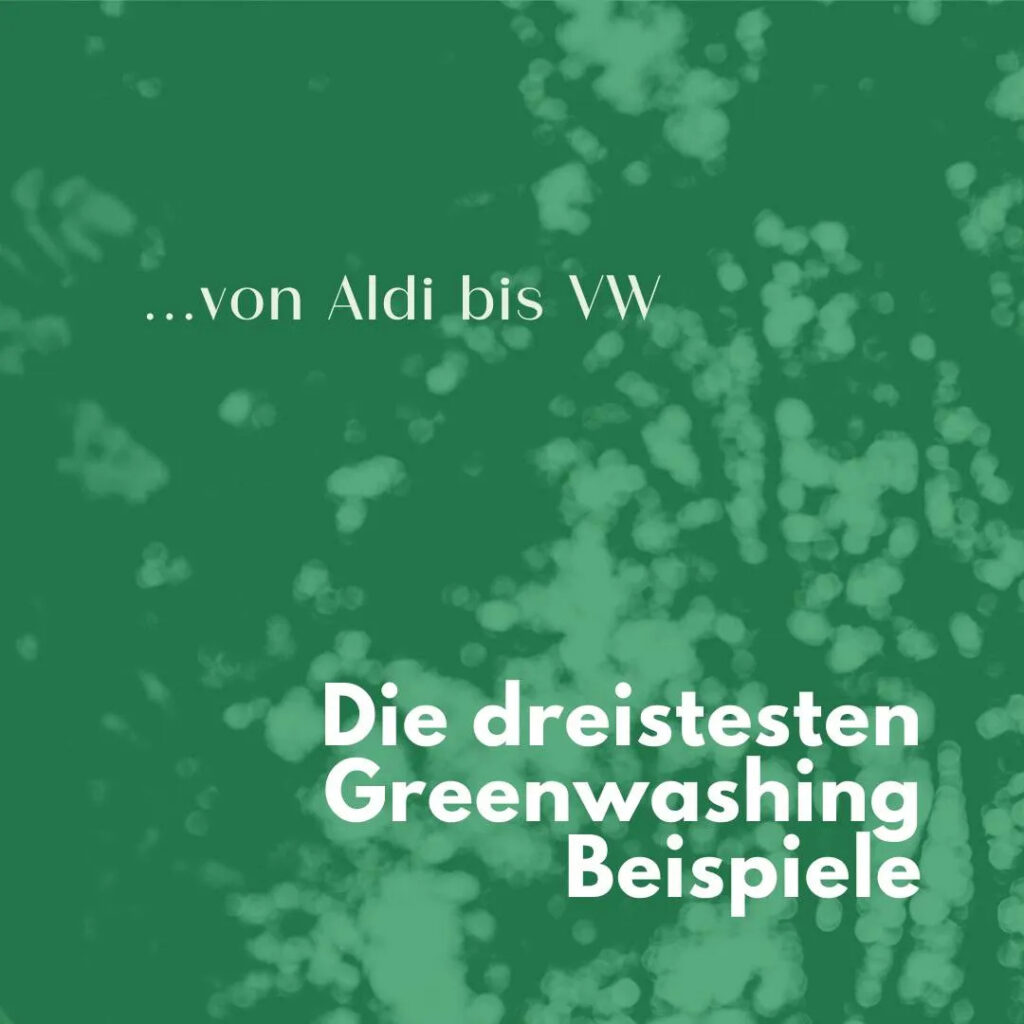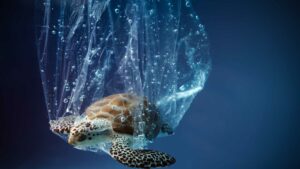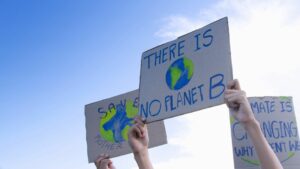Startseite » BIOvative Magazine » Von Aldi bis VW: Die dreistesten Greenwashing-Beispiele
Von Aldi bis VW: Die dreistesten Greenwashing-Beispiele
- 7. September 2023
- Autor: Philipp Dyllong
- Lesezeit: 10 Minuten
Unfortunately, examples of greenwashing are countless. In this article, we’ve explained to you the categories that companies use to deceive consumers. In practice, a variety of tactics and strategies are used to do this. In this post, we will go into more detail about some of the most brazen tactics and greenwashing scandals. We have compiled the 7 most common strategies of greenwashing for you in our article “What is Greenwashing”. We have grouped the examples mentioned here according to some common greenwashing methods.

Advertising campaigns
Advertising campaigns are one of the easiest ways for companies to engage in greenwashing. This is what happened recently with Deutsche Bank subsidiary DWS.
Greenwashing at investment company DWS
As an investment company, DWS is publicly committed to the Paris climate goals and compliance with the 1.5-degree target. At the same time, however, the company invests massively in the fossil fuel industry. According to Greenpeace, the investments amount to 7.8 billion euros. A study also commissioned by Greenpeace certifies that the company is on course for 2.6 degrees with its current investment policy. Well, so much for the noble goals that were announced to the public. A lawsuit is also currently being brought against DWS by the Baden-Württemberg consumer center on the grounds of unfair competition, since it falsely advertises sustainable investments.
Extra cents for disposable bags at Aldi Süd
Aldi has also launched a very well-known greenwashing campaign in the past. In order to reduce the consumption of plastic, the discount chain decided that disposable bags for fruit and vegetables would cost one cent extra. Of course, such a small payment does not have a steering effect on customers. On the contrary, critics have calculated that the extra cent will result in an annual net profit of €500,000 more for Aldi. The whole thing should be viewed all the more critically because Aldi already sells a large proportion of its goods packaged in plastic made from fossil materials.
Note: Not all plastics are the same. Films, bags and outer packaging made from renewable raw materials are also referred to as plastic. The term refers to the fact that the materials are artificially produced and do not occur exactly as they do in nature. However, biodegradable plastics with renewable raw materials leave a significantly smaller footprint.
Instead of using the extra cent to increase profits, using biodegradable bags with renewable raw materials would have been a real sustainable alternative for Aldi Süd. At least if sustainability and not just the sustainable external effect is really supposed to be in the foreground.
Irrelevant or non-meaningful labels and certifications
Companies like to use labels on their products to present themselves in a greener light. One label that is often seen and relatively well known is the MSC label.
MSC label from Unilever and the WWF
This label was launched by the environmental organization WWF in cooperation with the Unilever group and is intended to promote more sustainable fishing. The problem, however, is that according to MSC standards, the fishing method with bottom trawls is still permitted. With this method, the nets are dragged across the seabed, causing massive damage to it. Even the WWF now distances itself from the label, although it was involved in its founding.
The MSC label is by no means the only example of untrustworthy certificates. Other certificates such as RSPO, BCI or FSC do not stand for real sustainability either.
Lighthouse projects
Lighthouse projects refer to projects launched by companies to convey a strong role model and pioneering function.
Green cruises for a clear conscience
A very good example of this is the cruise operator AIDA. By now, many people know that cruises are the epitome of environmentally damaging vacations. As a refresher, cruise ships are usually powered by heavy fuel oil and cause daily CO² emissions of 84,000 cars and particulate matter emissions of 1,000,000 cars. Cities in whose ports many cruise ships dock suffer massively from this pollution. Added to this are practices such as waste disposal on the high seas.
AIDA uses the term Green Cruising in its advertising to counteract this negative image. However, only 1 of the provider’s 13 ships does not currently use heavy fuel oil. Two more are to be added by 2023. Instead, these ships will run on LNG, or liquefied natural gas. However, this is by no means as green as “green cruising” suggests. The extraction methodology for LNG is questionable at best, as it involves fracking. Fracking, in turn, carries many environmental risks, such as groundwater contamination, increased CO² emissions, and earthquakes. So all that is happening is that an extremely harmful fuel is being exchanged for a slightly less harmful fuel.
Hope Stories
So-called Hope Stories are hope-generating stories designed to influence public perception. They play on people’s emotions and are intended to portray the company as a savior in relation to an environmental issue.
Is IKEA "forest positive"?
A prime example of this is the commitment of the furniture manufacturer IKEA to be “forest positive”. The company is committed to climate protection and the preservation of forests. To this end, Ikea uses recycled and FSC-certified wood and promotes responsible forestry.
However, research by various NGOs such as Earthside and Agent Green has revealed that IKEA is sourcing illegally logged timber and that its suppliers have also carried out deforestation during the lockdown. For example, there is evidence of illegal logging in Ukraine, Romania and Siberia. So much for being a savior.
Lies
VW diesel scandal
Everyone remembers the VW diesel scandal. The company advertised its diesel vehicles as low-polluting and clean, especially in the USA, and thus sustainably increased its sales figures. So at least that was sustainable.
However, investigations revealed that VW had equipped its vehicles with manipulative software in order to comply with emissions regulations. However, the actual emissions when the vehicles were not on the test track were 40 times higher than allowed in the US.
This case is special because it is one of the few cases in which a company has had to publicly admit to greenwashing. The first BGH rulings on damages for consumers in the diesel scandal have also already been issued.
Staging of environmental organizations
Doubtful label
Companies are happy to cooperate with a serious environmental organization in order to increase their trustworthiness. As you have already seen with the MSC certificate, the WWF, for example, always tries to include industry and trade in its efforts.
In principle, this is a sensible approach, because without involving responsible parties, nothing can change in a sustainable way.
Nevertheless, environmental organizations are often too responsive to industry in this regard. By making too many concessions, they allow themselves to be instrumentalized. The result is, among other things, certificates that achieve nothing from an ecological or sustainability point of view. In addition to the MSC certificate, this also applies to the RSPO certificate for palm oil.
More greenwashing tactics
Of course, there are plenty of other tactics that companies use in greenwashing besides the strategies explained above. These include, among others, sustainability reports, the use of “green” influencers, or greenwashing.
In general, you can classify all greenwashing efforts into one of 7 categories that will help you identify greenwashing more easily.

Philipp Dyllong

Philipp Dyllong
These articles may also interest you

DINplus organic waste bag certification – for a clean garbage can
Content DINplus organic waste certification Advantages of DINplus certification Requirements of the DINplus certificate The certificate DINplus in detail Compostability at DINplus Basis for certification

Ocean Plastic: Greenwashing oder Lösung gegen die Plastikflut?
Content We are suffocating in plastic waste What is “Ocean Plastic” and how does it contribute to solving the crisis? How can plastic be recycled?

Klimaschutzklage: Wie gut stehen Deine Chancen, erfolgreich eine lebenswerte Zukunft einzuklagen?
Content The most important facts about the climate protection lawsuit Your right to climate protection The legal basis for the climate protection lawsuit Liveable future


